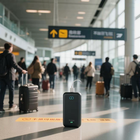
纽约时报|充电宝机场大逃亡!你的"续命神器"上黑名单了?
介绍: China Bans Some Portable Batteries From Flights as Safety Concerns Grow
In an era where smartphones and their accessories are as indispensable to travellers as passports and boarding passes, a sudden directive from China’s aviation authority has left many scrambling. Last weekend, travellers across the cou...
介绍: China Bans Some Portable Batteries From Flights as Safety Concerns Grow
In an era where smartphones and their accessories are as indispensable to travellers as passports and boarding passes, a sudden directive from China’s aviation authority has left many scrambling. Last weekend, travellers across the country were caught unawares when told at airport security that certain portable batteries—ubiquitous power banks—were no longer permitted on flights.
The Civil Aviation Administration of China (CAAC) issued an emergency ban on specific portable batteries, giving just 48 hours’ notice before the new rules came into effect on Saturday. The move follows mounting concerns about the safety risks posed by lithium-ion batteries, particularly after a spate of recalls and a handful of in-flight incidents.
Governments and airlines worldwide have already begun tightening restrictions on the transport of portable batteries, usually by regulating their storage and in-flight use. China, however, has taken a more hardline stance. Instead of merely issuing guidelines, the CAAC has opted for prohibition: any battery lacking a visible Chinese safety certification or subject to recall is now barred from aircraft cabins altogether.
The suddenness and severity of the rule change has prompted confusion—and in some cases, indignation—among travellers, many of whom were forced to discard their power banks at security checkpoints. These devices, once considered travel essentials, have now become liabilities. Some travellers have taken to social media to vent their frustrations, while others have simply resigned themselves to the loss.
The aftershocks have extended beyond the airport gates. On second-hand platforms such as Xianyu, bulk lots of used power banks are now being sold by weight. Sellers are notably cagey about the origin of these devices. When pressed, some quietly hint that their stockpiles were sourced from airports or trains, suggesting a burgeoning grey market for confiscated or discarded electronics.
The CAAC’s notice, released last Thursday, leaves little room for ambiguity. Any portable battery without clear markings attesting to compliance with Chinese safety standards is now disallowed in air cabins. Recalled devices are explicitly banned.
Authorities cite an accumulation of safety risks as justification. The aviation regulator points to both recent recalls issued by major manufacturers and multiple instances of battery fires aboard planes. The CAAC also noted that China’s market watchdog has suspended or revoked the safety certifications of several battery and battery cell producers in recent months.
“These developments demonstrate that portable batteries carried by passengers pose latent safety and quality hazards,” the CAAC said. “The risks they pose to the secure operation of civil aviation continue to escalate.”
Indeed, China’s battery sector has seen notable turbulence. In June alone, two leading Chinese battery manufacturers—Anker and Romoss—were forced to recall millions of power banks across China and the United States. The culprit in each case: defective lithium-ion cells sourced from external suppliers.
Anker, one of the world's largest producers of portable power devices, began the month by recalling over one million power banks sold in the U.S., citing fire hazards. Shortly thereafter, it withdrew seven additional models from the Chinese market—about 700,000 units in total. Later, the firm announced a global voluntary recall covering five more models, attributing the decision to problems with battery cells supplied by an unnamed vendor.
Romoss followed suit. The firm recalled nearly half a million units across three models, likewise blaming faulty components provided by a third-party supplier. Both companies have pledged to address the issue but have declined to name the suppliers responsible.
China’s clampdown comes against a broader regional backdrop of increasing scrutiny. In January, an Air Busan aircraft caught fire while parked on the tarmac in South Korea. Though the investigation is ongoing and no definitive link has been established, the incident has already prompted several Asian carriers to revise their own battery policies.
The Chinese government’s decision to enact a blanket ban—albeit a partial one—signals a clear pivot toward caution. It reflects a growing realisation that the proliferation of lithium-ion-powered devices, while convenient, is not without consequence. As regulators weigh risk against convenience, travellers may have to reconsider what they carry in their hand luggage—or risk seeing it disappear at the departure gate.
scramble /ˈskræmbl/ v. 匆忙应对
📚例句:We scrambled to finish the project before the deadline.
(我们赶在截止日前仓促完成项目)
🔍搭配:scramble for tickets 抢票
discard /dɪsˈkɑːd/ v. 丢弃
📚例句:She discarded old clothes from her wardrobe.
(她把旧衣服从衣柜里清理掉)
🔍搭配:discard rubbish 丢弃垃圾
liability /ˌlaɪəˈbɪləti/ n. 负担
📚例句:The broken car became a financial liability.
(坏掉的汽车成了经济负担)
🔍搭配:legal liability 法律责任
turbulence /ˈtɜːbjələns/ n. 动荡
📚例句:The company faced financial turbulence this year.
(公司今年面临财务动荡)
🔍搭配:economic turbulence 经济动荡
clampdown /ˈklæmpdaʊn/ n. 严厉打击
📚例句:The police launched a clampdown on illegal parking.
(警方严厉打击违章停车)
🔍搭配:government clampdown 政府严打
proliferation /prəˌlɪfəˈreɪʃn/ n. 激增
📚例句:Smartphones led to the proliferation of social media.
(智能手机导致社交媒体激增)
🔍搭配:nuclear proliferation 核扩散
更多节目 全部>
-
Vol.1175
-
CNN|开拓者16顺位豪赌中国天才!2米18的杨瀚森,真能接班姚明?
Vol.1174
-
华尔街日报|电车价格战再升级:小米YU7入场即王炸,下一个降价的会是谁?
Vol.1173
-
Vol.1171




